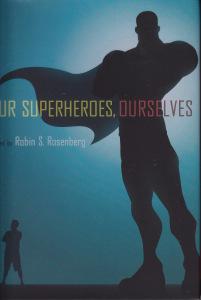 Intellectuals often have difficulty, it seems, taking popular culture seriously. I remember feeling slightly guilty taking a class on Science Fiction in college and actually getting credit for it. At the time—I remember the Dark Ages—a course on comic books, or even superheroes, would’ve been laughed out of the academy. And not in a good way. Monsters, likewise, were considered the opiate of the small-minded. I’m not sure what happened to turn all of this around, but I think my generation growing up may have had something to do with it. Scholars began to pay attention to more than the cheap paper and eye-catching, if impractical, costumes. There were, unnoticed by standard readers, messages embedded in comics. Superheroes may have been telling us something about ourselves. Now tenured professors can write about various caped crusaders without fear of ridicule. Some of the books are quite good.
Intellectuals often have difficulty, it seems, taking popular culture seriously. I remember feeling slightly guilty taking a class on Science Fiction in college and actually getting credit for it. At the time—I remember the Dark Ages—a course on comic books, or even superheroes, would’ve been laughed out of the academy. And not in a good way. Monsters, likewise, were considered the opiate of the small-minded. I’m not sure what happened to turn all of this around, but I think my generation growing up may have had something to do with it. Scholars began to pay attention to more than the cheap paper and eye-catching, if impractical, costumes. There were, unnoticed by standard readers, messages embedded in comics. Superheroes may have been telling us something about ourselves. Now tenured professors can write about various caped crusaders without fear of ridicule. Some of the books are quite good.
Robin S. Rosenberg’s Our Superheroes, Ourselves, is a rare example of a uniformly fascinating edited volume. Contributions from a variety of psychologists and psychologists explore several of the deeper aspects of the superhero phenomenon. Insightful and thought-provoking, this little book gives the lie to the frequent admonition of my youth that reading such things was a waste of time. Anything but. Now, I didn’t have the level of commitment to comics that Big Bang Theorists do, but I recall being entranced by much of what I read. Some comic panels are still vivid in my head, although I haven’t seen the original in more decades than I’d like to admit. They are, as one of the essays suggests, a form of modern mythology. Another form of modern mythology is the movie. Superhero movies are discussed as well as the print versions. These cheap, easily read books were more, it seems, than meets the eye. I’ve fallen a little behind in my superhero movies, but perhaps it is time to start trying to catch up with Superman.
What is really striking, to me, is the discussion of super-villains. As more than one contributor points out, you can’t have a superhero without the nemesis of an arch-criminal. This quite naturally leads to the discussion of abstracts: good and evil. Early comics tended to be Manichaean in this regard. In our world evil may be much more subtle than it appears on the outside. The book appropriately ends with a reflection on morality. More than one ethical system may be found in superhero tales. Super-villains, apart from becoming role models for some political candidates, allow us to explore our own dark sides. In the end, however, we know that Batman must overcome the Joker, no matter how appealing he may be.
